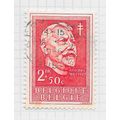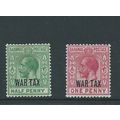Crimean War - Lord Raglan, Omar Pasha, General Pelissier 1855 - Museum postcard
- Condition : Used
- Dispatch : 2 Days
- Brand : None
- ID# : 192693134
- Quantity : 1 item
- Views : 99
- Location : United Kingdom

- Seller : justthebook (+1704)
- Barcode : None
- Start : Sat 16 May 2020 02:58:35 (EDT)
- Close : Run Until Sold
- Remain : Run Until Sold
Checks/Cheques
 for 1 item(s) edit
for 1 item(s) edit
Shipping Calculator
More Listings from This Seller view all
Seller's Description
- Postcard
- Picture / Image: Council of War [Crimean War] - Lord Raglan, Omar Pasha & General Pelissier June 7th 1855 - photo by Roger Fenton
- Publisher: Victoria and Albert Museum, London
- Postally used: no
- Stamp: n/a
- Postmark(s): n/a
- Sent to: n/a
- Notes / condition:
Please ask if you need any other information and I will do the best I can to answer.
Image may be low res for illustrative purposes - if you need a higher definition image then please contact me and I may be able to send one. No cards have been trimmed (unless stated).
------------------------------------------------
Postage & Packing:
Postage and packing charge should be showing for your location (contact if not sure).
No additional charges for more than one postcard. You can buy as many postcards from me as you like and you will just pay the fee above once. Please wait for combined invoice. (If buying postcards with other things such as books, please contact or wait for invoice before paying).
Payment Methods:
UK - PayPal, Cheque (from UK bank) or postal order
Outside UK: PayPal ONLY (unless otherwise stated) please. NO non-UK currency checks or money orders (sorry).
NOTE: All postcards are sent in brand new stiffened envelopes which I have bought for the task. These are specially made to protect postcards and you may be able to re-use them. In addition there are other costs to sending so the above charge is not just for the stamp!
I will give a full refund if you are not fully satisfied with the postcard.
----------------------------------------------
Text from the free encyclopedia WIKIPEDIA may appear below to give a little background information (internal links may not work) :
*************
The Crimean War (French: Guerre de Crimée; Russian: Кры́мская война́, translit. Krymskaya voyna or Russian: Восто́чная война́, translit. Vostochnaya voyna, lit. 'Eastern War'; Turkish: Kırım Savaşı; Italian: Guerra di Crimea) was a military conflict fought from October 1853 to February 1856[6] in which the Russian Empire lost to an alliance of the Ottoman Empire, France, Britain and Sardinia. The immediate cause involved the rights of Christian minorities in the Holy Land, which was a part of the Ottoman Empire. The French promoted the rights of Roman Catholics, while Russia promoted those of the Eastern Orthodox Church. The longer-term causes involved the decline of the Ottoman Empire and the unwillingness of Britain and France to allow Russia to gain territory and power at Ottoman expense. It has widely been noted that the causes, in one case involving an argument over a key, have never revealed a "greater confusion of purpose", yet led to a war noted for its "notoriously incompetent international butchery".[7]
While the churches worked out their differences and came to an agreement, Nicholas I of Russia and the French Emperor Napoleon III refused to back down. Nicholas issued an ultimatum that the Orthodox subjects of the Ottoman Empire be placed under his protection. Britain attempted to mediate and arranged a compromise that Nicholas agreed to. When the Ottomans demanded changes, Nicholas refused and prepared for war. Having obtained promises of support from France and Britain, the Ottomans declared war on Russia in October 1853.
The war started in the Balkans in July 1853, when Russian troops occupied the Danubian Principalities[6] (part of modern Romania), which were under Ottoman suzerainty, then began to cross the Danube. Led by Omar Pasha, the Ottomans fought a strong defensive campaign and stopped the advance at Silistra. A separate action on the fort town of Kars in eastern Anatolia led to a siege, and a Turkish attempt to reinforce the garrison was destroyed by a Russian fleet at Sinop. Fearing an Ottoman collapse, France and Britain rushed forces to Gallipoli. They then moved north to Varna in June 1854, arriving just in time for the Russians to abandon Silistra. Aside from a minor skirmish at Köstence (today Constanța), there was little for the allies to do. Karl Marx quipped, "there they are, the French doing nothing and the British helping them as fast as possible".[8]
Frustrated by the wasted effort, and with demands for action from their citizens, the allied force decided to attack Russia's main naval base in the Black Sea at Sevastopol on the Crimean peninsula. After extended preparations, the forces landed on the peninsula in September 1854 and marched their way to a point south of Sevastopol after the successful Battle of the Alma. The Russians counterattacked on 25 October in what became the Battle of Balaclava and were repulsed, but at the cost of seriously depleting the British Army forces. A second counterattack, at Inkerman, ended in stalemate. The front settled into a siege and led to brutal conditions for troops on both sides. Smaller actions were carried out in the Baltic, the Caucasus, the White Sea, and in the North Pacific.
Sevastopol fell after eleven months, and neutral countries began to join the Allied cause. Isolated and facing a bleak prospect of invasion from the west if the war continued, Russia sued for peace in March 1856. This was welcomed by France and Britain, as the conflict was growing unpopular at home. The war was ended by the Treaty of Paris, signed on 30 March 1856. Russia was forbidden to host warships in the Black Sea. The Ottoman vassal states of Wallachia and Moldavia became largely independent. Christians there were granted a degree of official equality, and the Orthodox Church regained control of the Christian churches in dispute.[9]:415
The Crimean War was one of the first conflicts to use modern technologies such as explosive naval shells, railways, and telegraphs.[10](Preface) The war was one of the first to be documented extensively in written reports and photographs. As the legend of the "Charge of the Light Brigade" demonstrates, the war quickly became an iconic symbol of logistical, medical and tactical failures and mismanagement. The reaction in the UK was a demand for professionalisation, most famously achieved by Florence Nightingale, who gained worldwide attention for pioneering modern nursing while treating the wounded.
The Crimean War[11] proved to be the moment of truth for Nikolaevan Russia. Its humiliating outcome forced Russia’s educated elites to identify the Empire’s problems and recognize the need for fundamental transformations aimed at modernizing and restoring Russia’s position in the ranks of European powers. Historians have studied the role of the Crimean War as a catalyst for the reforms of Russia’s social institutions: serfdom, justice, local self-government, education, and military service. More recently, scholars have also turned their attention to the impact of the Crimean War on the development of Russian nationalistic discourse.
Field Marshal FitzRoy James Henry Somerset, 1st Baron Raglan, GCB, PC (30 September 1788 – 28 June 1855), known before 1852 as Lord FitzRoy Somerset, was a British Army officer. As a junior officer he served in the Peninsular War and the Hundred Days, latterly as military secretary to the Duke of Wellington. He also took part in politics as Tory Member of Parliament for Truro before becoming Master-General of the Ordnance. He became commander of the British troops sent to the Crimea in 1854: while his primary objective was to defend Constantinople he was ordered to besiege the Russian Port of Sevastopol. After an early success at the Battle of Alma, a failure to deliver orders with sufficient clarity caused the fateful Charge of the Light Brigade at the Battle of Balaclava. Despite further success at the Battle of Inkerman, a piecemeal allied assault on Sevastopol in June 1855 was a complete failure. Raglan died later that month, while suffering with dysentery and depression.
Omar Pasha, also known as Omar Pasha Latas (Turkish: Ömer Paşa, Serbian: Омер-паша Латас/Omer-paša Latas; 1806–1871) was an Ottoman field marshal and governor. He was born in Austrian territory, to Serbian Orthodox Christian parents, and was initially an Austrian soldier. When faced with charges of embezzlement, he fled to Ottoman Bosnia and converted to Islam, and then joined the Ottoman army where he quickly climbed in ranks. Latas crushed several rebellions throughout the Empire, and was a commander in the Crimean War, where he won some outstanding victories at Silistra and Eupatoria and participated in the siege of Sevastopol.
After escaping to Bosnia and living rough for a time, Latas was offered a position as tutor to the children of a Turkish merchant, on condition that he converted from Christianity to Islam and was circumcised. After his conversion he took the new name Omar. A necessary condition to fulfill in order to get off the streets, it was a huge cultural step that led naturally to his decision that his future lay with the Ottomans. The big break came for the newly named Omar when the family moved to Constantinople. By astute networking and doubtless exploiting his curiosity value as an ex-European military man, he was appointed lecturer at the Turkish Military Academy. With this exposure he shone enough to be snapped up as aide-de-camp to the Polish–Ottoman General Wojciech Chrzanowski, who was engaged in the re-organization of the Ottoman Army after the defeat of the Janissaries.[7]
Now a major, Omar completed a mapping assignment in Bulgaria and the Danube territories, gaining detailed knowledge of the ground which was to serve him well in the future. Chrzanowski also milked his ideas for re-organizing the Army; in return he smoothed the way for Omar's introduction into Turkish society. He thereby met and married a rich heiress Adviye Hanım (a daughter of Çerkes Hafız Mehmed Pasha), the start of his meteoric rise in Ottoman military circles. There is no doubt that Omar's marriage opened all the right doors for him,[7] but equally no doubt that he proved equal to the challenges of high command which resulted. He became writing-master to the Ottoman heir, Abd-ul-Medjid, and on the succession of the latter in 1839 was made a colonel. He was shortly afterwards appointed Military Governor of Constantinople. His only daughter, Saffet Hanım, married Mustafa Celalettin Pasha.
Aimable-Jean-Jacques Pélissier, 1st Duc de Malakoff (6 November 1794 – 22 May 1864), was a Marshal of France.
Pélissier was born at Maromme (Seine Inférieure), of a family of prosperous artisans, his father being employed in a powder-magazine. After attending the military college of La Flèche and the special school of St Cyr, he entered the army in 1815 as second-lieutenant in an artillery regiment. Brilliant examination results in 1819 secured his appointment to the staff. He served as aide-de-camp in the Spanish campaign of 1823, and in the expedition to the Morea, 1828-1829. In 1830, he took part in the expedition to Algeria, and on his return was promoted to the rank of chef d'escadron.[1]
After some years of staff service in Paris, he was again sent to Algeria as chief of staff of the province of Oran with the rank of lieutenant-colonel, and remained there until the Crimean War, taking a leading part in many important operations. However, the severity of his conduct in suffocating a whole Arab tribe in the Dahra or Dahna caves, near Mostaganem, where they had taken refuge (18 June 1845), aroused such indignation in Europe that Marshal Soult, the minister of war, publicly expressed his regret; but Marshal Bugeaud, the governor-general of Algeria, not only approved, but secured for Pélissier the rank of général de brigade (Brigadier-General), which he held until 1850, when he was promoted to général de division (Major-General).[1] In 1852 he successfully commanded the Siege of Laghouat.[citation needed]
After the battles of October and November 1854 before Sevastopol, Pélissier was sent to the Crimea, where on 16 May 1855 he succeeded Marshal Canrobert as commander-in-chief of the French forces before the Siege of Sevastopol. His command was marked by relentless pressure of the enemy and unalterable determination to conduct the campaign without interference from Paris. His perseverance was crowned with success in the storming of the Tower of Malakoff on 8 September which ended the Siege of Sebastopol, crowning the Anglo-French Crimean War against Russia with victory. On the 12th he was promoted to marshal. On his return to Paris he was named senator, created Duke of Malakoff (22 July 1856; the only other victory title awarded by Napoleon III, also ducal, was for the victory by Patrice de MacMahon in the battle of Magenta, in the Italian campaign), and rewarded with a grant of 100,000 francs per annum.[1]
From March 1858 to May 1859, he was French ambassador in London, but was recalled to take command of the army of observation on the Rhine. In the same year, he became Grand Chancellor of the Legion of Honour. In 1860, he was appointed Governor-General of unruly colony of Algeria.[1]
His Excellency the Duke died there in 1864, when the dukedom became extinct.[1]
Listing Information
| Listing Type | Gallery Listing |
| Listing ID# | 192693134 |
| Start Time | Sat 16 May 2020 02:58:35 (EDT) |
| Close Time | Run Until Sold |
| Starting Bid | Fixed Price (no bidding) |
| Item Condition | Used |
| Bids | 0 |
| Views | 99 |
| Dispatch Time | 2 Days |
| Quantity | 1 |
| Location | United Kingdom |
| Auto Extend | No |




















